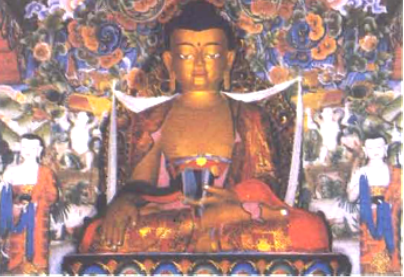- Books Name
- CBSE Class 6 Social Science Book
- Publication
- Param Publication
- Course
- CBSE Class 6
- Subject
- Social Science
* Buddhism

Life of the Buddha – Lord Buddha also came from a royal family. His father, Shuddhodana, was the King of Kapilvastu. Buddha was born in the 6th century B.C. at a place called the Lumbini Garden, when his mother, Mahamaya, was returning from her mother's house. She died when the prince was hardly seven days old.
It is said that Siddhartha (that was the real name of Buddha) took no interest in worldly affairs and spent long hours in meditation. Therefore, his royal father, who wanted to divert his attention to the material joys of the world, arranged his marriage with a beautiful princess, Yashodhara.
* The Great Renunciation
All comforts of palace-life and the joys of material bliss could not affect the prince much. One day, driving with this charioteer, Channa, he came across a sick man, then an old man with his back bent, and still another day, he saw the agony of death. All these sights made him sad and he clamoured to find the means for salvation. He felt like a bird in a cage. So, one night when his wife was asleep, he slipped away from his royal bedroom and renounced the world. He was then only 29 years old. This event is called as 'the Great Renunciation.'
* Preaching Work
Buddha delivered his first sermon in the 'Deer Park', Sarnath, near Benaras and converted five disciples to Buddhism. This very event is known as "Dharma Chakra Pravartana" or "Turning of the Wheel of Law" in the history of Buddhism. The rest of his life, about 45 years, Buddha spent in preaching his religion moving from one part of the country to another.
* Teaching of Lord buddha
Four Noble Truths and Eight-Fold Path - According to Buddha, there are Four Noble Truths : (i) This world is full is misery and sorrow; (ii) The main cause of all this misery and sorrow is desire; (iii) Misery and sorrow can be ended by killing the desire (iv) This desire can be suppresed or killed by following the Eight-fold Path. The Eight-fold Path, which every Buddhist is expected to follows, consists of the following eight principles which were based on high morals and righteous conduct :
(1) Right Belief , (2) Right Thought, (3) Right speech, (4) Right Action, (5) Right living , (6) Right Effort, (7) Right Recollection, (8) Right Meditation.
He avoided the extremes and followed the middle path.
Ahimsa – Like Mahavira, Buddha laid great emphasis on Ahimsa or non-injury to animals.
Nirvana – According to Buddha, the chief aim of man's life should be the attainment of Nirvana or the 'Ultimate Salvation', which can be achieved only by following the eight-fold path of virtuous living.
Faith in the Theory of Karma – Like the Hindus and Jains, the Buddha too believed in the theory of Karma. He said that everybody has to reap the fruits of the seeds he has sown.
No Faith in Yajnas, Sacrifices and Ritualism – Like Mahavira, Buddha had no faith in yajnas and costly sacrifices where animals were sacrificed in large numbers.
No Faith in the Caste-System – He had no faith in the caste system and treated all men as equal. He embraced even the humblest among the low-caste into his fold.
Silence over the Existence of God – The Buddha was silent over the existence of God as he wanted to keep his new faith above controversy.

 Param Publication
Param Publication
